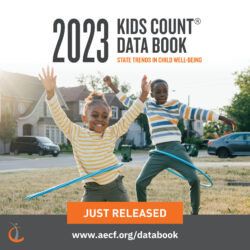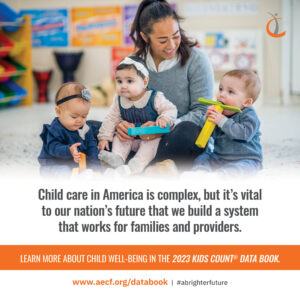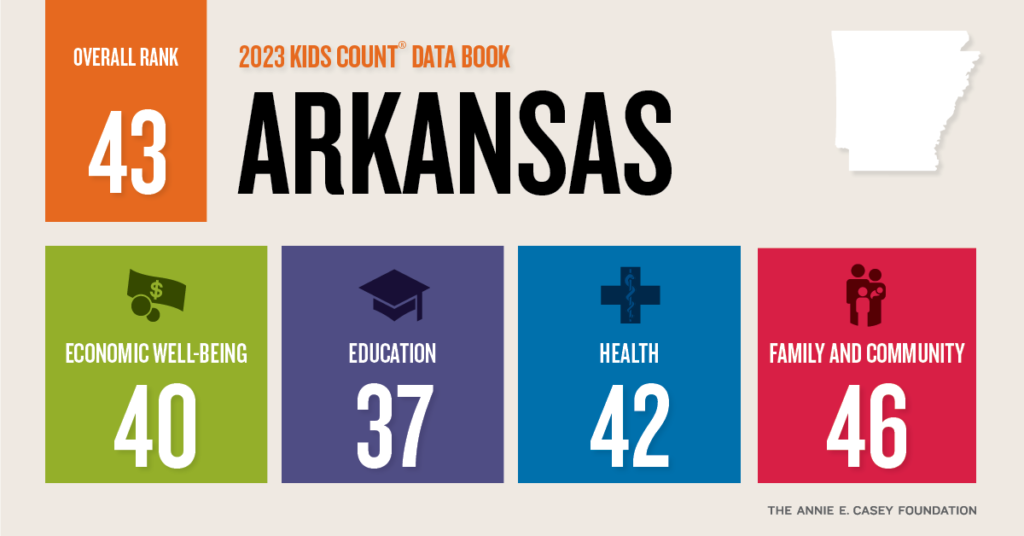
50-state Data show economy loses $122 billion a year as child care challenges cause parents to miss, quit or scale back work, Annie E. Casey Foundation finds.
Arkansas parents are struggling more than most to access quality child care, according to the 2023 KIDS COUNT® Data Book, a 50-state report of recent household data developed by the Annie E. Casey Foundation analyzing how children and families are faring. Indeed, Arkansas’s child care challenges are part of a national trend in which our country’s lack of affordable and accessible child care short-changes children and causes parents to frequently miss work or even quit their jobs, while those who can find care are paying dearly for it. These child care challenges cost the American economy billions of dollars a year and stymie women professionally.
High-quality child care is a key component of an economy that largely requires both parents to work outside the home while raising children. But too many Arkansas families struggle to find affordable, quality child care, often preventing them from paying rent and buying life’s necessities, like food, diapers and clothes. These challenges compound to negatively impact overall child well-being.
Arkansas has consistently ranked in the bottom 10 states overall and on specific child well-being indicators, including this year ranking 44th for teens not in school and not working, 43rd for eighth-graders not proficient in math, 42nd in low birth-weight babies, and 50th for teen births. This year Arkansas ranks 43rd overall.
This year’s KIDS COUNT data makes it clear our state must place a greater focus on improving child well-being outcomes. Arkansas’s continually poor rankings are evidence we have not invested enough in proven areas — like child care and early childhood education — to better the lives of our children.

The Data Book reports too many parents cannot secure child care that is compatible with work schedules and commutes. The Data Book reports that in 2020-21, 15% of children birth to age 5 in Arkansas lived in families in which someone quit, changed, or refused a job because of problems with child care. Arkansas’s rate is in the top five worst when it comes to problems accessing child care.
In Arkansas, the data show availability and accessibility are greater problems than affordability. Even though other states have much higher costs, Arkansas families struggle just as much or more to find child care. The discrepancy highlights the need for increased availability and accessibility of child care in Arkansas while keeping costs affordable for parents. Even when they’re available to parents, child care options are often too far away, not on the way to work, or not reachable via our state’s limited public transit.
Without state investment in child care programs, the solution to increasing the number of spots available is left to child care businesses, which are forced to either burden families with higher costs or to underpay child care workers. Arkansas’s 22% child poverty rate makes it clear that our families can neither afford to pay higher child care costs, nor can child care workers (often mothers themselves) afford to make less than they already do.
The failings of the child care market also affect the current and future health of the American economy, costing $122 billion a year in lost earnings, productivity and tax revenue, according to one study. All of these challenges put parents under tremendous stress to meet the dual responsibilities of providing for their families and ensuring their children are safe and nurtured.
Each year, the Data Book presents national and state data from 16 indicators in four domains — economic well-being, education, health, and family and community factors — and ranks the states according to how children are faring overall. Arkansas’s overall ranking remains stuck at 43rd, with minor fluctuations within the individual domains. The current child care crisis is yet another barrier to progress.

If we want to see improvements in reading and math proficiency, in the rates of children with parents who lack secure employment, and in child poverty in Arkansas, we need the state to invest in child care.
“A good child care system is essential for kids to thrive and our economy to prosper. But our current approach fails kids, parents, and child care workers by every measure,” says Lisa Hamilton, president and CEO of the Annie E. Casey Foundation. “Without safe child care they can afford and get to, working parents face impossible choices, affecting not only their families, but their employers as well.”
Transitioning from a faltering child care system to creating a flourishing one will take new thinking and investing at the local, state, and national levels. An executive order issued by President Biden in April is aimed at expanding access, lowering costs, and raising wages. It could prove to be a helpful framework, but more is needed:
- Federal, state, and local governments should invest more in child care. State and local governments should maximize remaining pandemic recovery act dollars to fund needed child care services and capacity. Congress should reauthorize and strengthen the Child Care and Development Block Grant Act, and increase funding for public pre-kindergarten and Head Start.
- Public and private leaders should work together to improve the infrastructure for home-based child care, beginning by lowering the barriers to entry for potential providers by increasing access to start-up and expansion capital.
- To help young parents, Congress should expand the federal Child Care Access Means Parents in School (CCAMPIS) program, which serves student parents.
